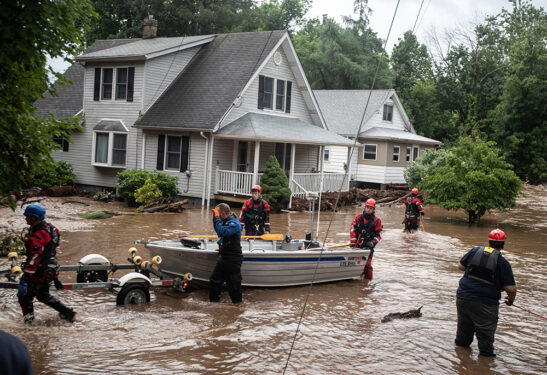
By Cori Fugere Urban, Gina Christian
BURLINGTON, Vt. (OSV News) — Torrential rains brought up to 9 inches of rain to the Green Mountain State July 10, leaving Vermont highways closed, roads eroded, homes and businesses flooded and emergencies declared.
But no significant damage to church-owned properties had been reported as of the next morning.
According to Peter Beauregard, director of properties for the Diocese of Burlington, as of 8:30 a.m. July 11, there was “nothing major” reported for damage to church properties. There was, however, “light flooding in the basements” in church property in the central Vermont areas of Barre and Montpelier and the southern area of Wilmington. “At this stage we have several properties with minor flooding within the spaces below grade with minimum property loss. We are still waiting to see where the high-water mark will be on a few rivers that are still rising.”
He asked parish staffs to “visit every site to be sure we have no damage from the deluge of rain the past few days.”
Parts of one of Vermont’s main highways, Interstate 89, were closed in both directions July 10. According to Vermont State Police, the closures were necessary because of excessive water on the roadway and the inability of drainage systems to keep pace with the volume of water.
Vermont State Police was aware of reports that an unknown number of vehicles were stranded in the vicinity of the on-ramps to I-89 northbound and southbound in Montpelier. There were no reports of immediate threats posed by high water, but the vehicles were unable to move due to flooding and road closures in the area. The state police coordinated a response to this situation, determining the level of public assistance needed, and worked to help vehicles travel southbound on the interstate from this location.
President Joe Biden declared a state of emergency in Vermont July 11.
Vermont Emergency Management warned the same day that dangers from flooding were not over and urged people continue to use caution noting that floodwaters might contain downed power lines, human and livestock waste, hazardous waste, physical objects and debris, and wild or stray animals.
Across the Connecticut River in New Hampshire, southwestern towns of Winchester and Swanzey were hard hit by flood waters that eroded roads and overflowed a dam. Father Alan Tremblay, pastor of Parish of the Holy Spirit which includes the affected towns, said July 11 that no requests for aid had yet been made, “but that doesn’t mean it won’t happen.”
He suggested that the parish would be offering assistance as needs arose when fall-out from the flooding was felt in the future. “People here look out for each other, … and the church always strives to connect with people” in need, he told Vermont Catholic, Burlington’s diocesan publication.
He expects parishioners will be looking for ways to help their neighbors affected by the flooding “as the days unfold,” and the parish — with two churches in Keene and one in Hinsdale — “stands ready to help because of the generosity of parishioners.”
There are two St. Vincent de Paul food pantries in the parish, one in Keene and one in Winchester.
In Vermont, Vermont Catholic Charities Inc. has an emergency assistance fund.
